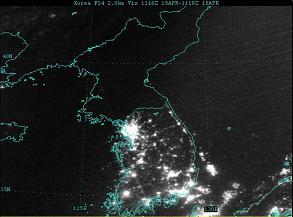Banner Year
BURT HERMAN
BEIJING (AP, CBC) September 18, 2005 - The United Nations will end a decade of emergency food shipments to North Korea by January at the request of the impoverished nation's government, which says it has enough food coming from other sources, a UN official said Sunday. It took Kim ten years of tyrant practice to learn how to feed his people... Richard Ragan, head of the World Food Program's office in Pyongyang, said the agency will focus on development projects in North Korea. Nuclear development? Discussions are continuing with donors to find support for the shift, he said in a telephone interview while in Beijing. North Korea has made requests to halt emergency food aid in the past, and Ragan said officials for the communist regime told him they believed they are now able to meet their food needs. For now. "They claim they have enough food coming in from other sources," he said, indicating that included aid from South Korea and increased trade with China. "They didn't want to create a culture of dependency." The culture Kim Jong Il has created is already dependent, in my opinion. North Korea has relied on foreign aid to feed its 22 million people since Kim Jong Il took power disclosing in the mid-1990s that its government-run farm system had collapsed. Famine has killed an estimated 2 million people. Since starting emergency aid in 1995, the year AFTER Kim started his "reign of despair", the WFP has distributed about 4 million tons of food worth $1.5 billion US to North Koreans. The assistance has fed, on average, about 6.5 million people a year. This did not stop the North Korean government from spewing hate against the Good people that GAVE it to them...
The North Korean government has blamed the country's food shortage on natural disasters and loss of outside support after the collapse of the Soviet Union at the start of the 1990s. But others say outdated farming technology and a refusal to reform are also to blame.
Why does South Korea always have fields of rice like the one shown on Right? How was South Korea spared from a decade of "natural disaster"?
BEIJING (AP, CBC) September 18, 2005 - The United Nations will end a decade of emergency food shipments to North Korea by January at the request of the impoverished nation's government, which says it has enough food coming from other sources, a UN official said Sunday. It took Kim ten years of tyrant practice to learn how to feed his people... Richard Ragan, head of the World Food Program's office in Pyongyang, said the agency will focus on development projects in North Korea. Nuclear development? Discussions are continuing with donors to find support for the shift, he said in a telephone interview while in Beijing. North Korea has made requests to halt emergency food aid in the past, and Ragan said officials for the communist regime told him they believed they are now able to meet their food needs. For now. "They claim they have enough food coming in from other sources," he said, indicating that included aid from South Korea and increased trade with China. "They didn't want to create a culture of dependency." The culture Kim Jong Il has created is already dependent, in my opinion. North Korea has relied on foreign aid to feed its 22 million people since Kim Jong Il took power disclosing in the mid-1990s that its government-run farm system had collapsed. Famine has killed an estimated 2 million people. Since starting emergency aid in 1995, the year AFTER Kim started his "reign of despair", the WFP has distributed about 4 million tons of food worth $1.5 billion US to North Koreans. The assistance has fed, on average, about 6.5 million people a year. This did not stop the North Korean government from spewing hate against the Good people that GAVE it to them...

The North Korean government has blamed the country's food shortage on natural disasters and loss of outside support after the collapse of the Soviet Union at the start of the 1990s. But others say outdated farming technology and a refusal to reform are also to blame.

Why does South Korea always have fields of rice like the one shown on Right? How was South Korea spared from a decade of "natural disaster"?


0 Comments:
Post a Comment
<< Home